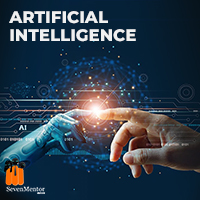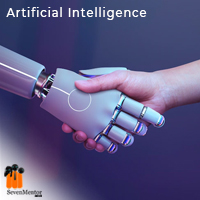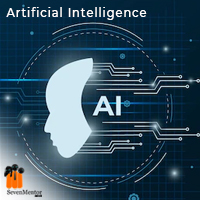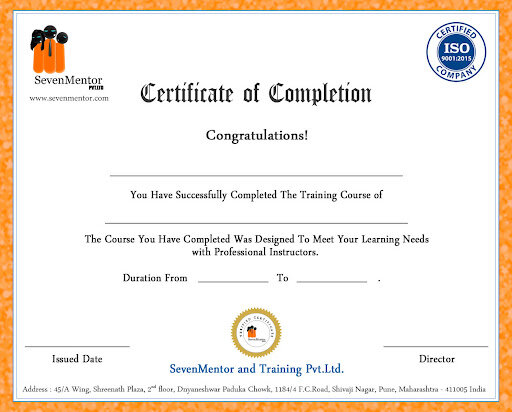Artificial Intelligence
Encourage New topics in AI and learn to keep yourself updated and implement using it without affecting the human force or the breadwinners. Artificial intelligence courses in Vapi are the world's future. AI is now used in almost every app and website for the majority of its functionalities.
Call The Trainer
Batch Timing
- Regular: 2 Batches
- Weekends: 2 Batches
Request Call Back
Class Room & Online Training Quotation
About Artificial Intelligence
Machines learns from previous data and behaviors, whether positive or bad. With this new knowledge, the machine can repair itself so that the faults do not reoccur, as well as make any necessary adaptations to handle new inputs. Finally, the machine can carry out human-like duties. They're used for facial recognition locks, registering and verifying your security for transactions, and, more recently, putting your face on various characters in gaming and non-gaming apps. All of this is made feasible by artificial intelligence.
What Is the Role of an AI class in Vapi Engineer?
An AI engineer creates AI models by combining machine learning algorithms and deep learning neural networks to get business insights that may be utilised to make enterprise-wide decisions. Depending on the goals they intend to achieve, these engineers can construct weak or strong AI training in Vapi's.
AI engineers are well-versed in programming, software engineering, and data science. They employ various tools and approaches to process data as well as construct and manage AI systems.
What Qualifies One to Become an AI course in Vapi Engineer?
To become an expert in artificial intelligence, you must first complete the following steps:
Obtain a High School Diploma
To enter the profession of artificial intelligence engineering, you must first obtain a high school certificate with a specialisation in a scientific discipline, such as chemistry, physics, or mathematics. You can also include statistics as one of your basic disciplines in your education. If you graduate from high school with a strong foundation in scientific topics, you will have a firm platform on which to build your subsequent study.
Earn a Bachelor's Degree
You have the option of enrolling in a three-year Bachelor of Science (B.Sc.) degree instead. It is also feasible to obtain an engineering degree in a theoretically equivalent discipline, such as information technology or computer science, and then specialise in artificial intelligence in addition to data science and machine learning. You may need to perform well on the Joint Entrance Examination to gain admission to famous engineering institutes such as NITs, IITs, and IIITs (JEE).
Study for a Master's Degree
You may wish to explore acquiring your master's degree in a related area to raise your income potential and competition for Artificial Intelligence classes in Vapi engineering jobs. It may give you a thorough understanding of the subject as well as particular technical skills. In order to enrol in an engineering programme, you may need to take the GATE exam.
Acquire Certifications
Participating in Artificial Intelligence Course in Vapi may allow you to improve your skills at a lesser cost. You can study artificial intelligence and machine learning at the graduate and postgraduate levels. You can obtain online certificates at your own pace through a variety of platforms, like Simplilearn, which offers online training courses.
Look for Work
After you've gained adequate knowledge of the subject, you can start applying for jobs in the fields of artificial intelligence (AI), deep learning, and machine learning. There are numerous career opportunities in this industry, including data scientist, AI expert, machine learning developer, robotics engineer, and data scientist.
AI course in Vapi Case Studies
The term "Artificial Intelligence" refers to machines, specifically computer systems, simulating human intelligence processes. Expert systems, speech recognition, machine vision, and natural language processing are also included (NLP).
The cognitive parts of AI programming are learning, reasoning, and self-correction.
Processes of Learning
Processes of Reasoning
Processes of Self-Correction
Processes of Learning
This aspect of AI programming is focused with data collection and the development of rules for translating it into valuable knowledge. The rules, also known as algorithms, provide computing equipment with step-by-step instructions for completing a certain task.
Processes of Reasoning
This aspect of AI programming is involved with determining the optimum algorithm to achieve the desired outcome.
Processes of Self-Correction
This aspect of AI programming tries to fine-tune algorithms on a frequent basis in order to provide the most dependable results available.
AI-Artificial Intelligence Examples
The following are some AI-Artificial Intelligence examples:
Google Maps and Ride-Hailing Services
Face recognition and detection
Autocorrect and Text Editors
Chatbots
E-Payments
Algorithms for Search and Recommendation
Assistant Digital
Social networking sites
Healthcare\sGaming
Network of Online Ads
Finance and banking
Home automation gadgets
Surveillance and security
App for Smart Keyboard
Intelligent Speaker
E-Commerce
Intelligent Email Apps
Streaming Service for Music and Media
How is artificial intelligence manipulated?
AI, or artificial intelligence, is a well-known buzzword that you've probably heard or read about. When you hear the term artificial intelligence, you might think of stories about robots, technology, and the digital era. However, what specifically is it, and how does it act?
Artificial intelligence is a technological advancement that uses programming technology to solve problems. Artificial intelligence is often considered in conjunction with machine learning, deep learning, and big data. This lesson will go through what artificial intelligence is, how it works, and what we may expect from it in the future.
How does artificial intelligence work?
Knowing what AI is one thing; understanding its core functions is quite another. Artificial intelligence works by processing data using sophisticated algorithms. It uses algorithms to trawl through massive data sets, learning from patterns or features in the data. There are numerous theories and subfields in AI systems, such as:
Learning by machine. Machine learning uses neural networks to extract hidden insights from data without being instructed to look for or draw conclusions. Machine learning is a popular method for programmes to discover patterns and improve their intelligence over time.
Deep understanding. Deep learning employs massive neural networks with multiple layers, using their size to process massive volumes of data with complicated patterns.
Computing that is cognitive. The goal of cognitive computing is to achieve human-like interaction with machines. Consider robots that can see and hear and then respond like humans.
Vision in a computer. Pattern recognition and deep learning are used in AI to comprehend a photo or video. This means that the machine can look about, take images or movies, and understand its environment in real time.
The overarching goal of AI is to create software that can learn about an input and explain it with its output. Although artificial intelligence provides human-like interactions, it will not replace humans anytime soon.
How is artificial intelligence used?
All around us, artificial intelligence is standing operated in hundreds of numerous ways. It has changed our world and made our lives easier and more enjoyable. Among the several AI applications you may be aware of are:
Recognition of voice. Most people know to ask Siri or their smart home Alexa to set a timer when they need directions. This is an example of artificial intelligence. Siri, Alexa, and other voice recognition systems use machine learning to learn about you and your preferences, allowing them to better help you. These devices also utilize artificial intelligence to answer your questions or perform the tasks you request.
Vehicles that drive themselves. Machine learning and picture recognition are two examples.
Online Classes
Learn in-depth and win the accuracy in achieving. Career is an aspect that appears in graduates' minds. At SevenMentor &Training Pvt. Ltd.. we encourage fresh and experienced candidates to learn more. We train and our team understands your talents and improves your skills. Our practice tests and exams enhance your knowledge of online Artificial Intelligence Classes in Vapi. Our staff can motivate and solve your queries regarding different aspects of the respective Courses you attend. It is our pleasure to train you adequately and analyze your performance. We evaluate and correct you. Our motive is to establish a knowledgeable candidate coming forward to perform organizational operations effectively.
Course Eligibility
- Freshers
- BE/ Bsc Candidate
- Working Professional
- Any Graduate
- Any Post-Graduate
- Developers
Syllabus of Artificial Intelligence
- Artificial Intelligence
- An Introduction to Artificial Intelligence
- History of Artificial Intelligence
- Future and Market Trends in Artificial Intelligence
- Intelligent Agents – Perceive-Reason-Act Loop
- Search and Symbolic Search
- Constraint-based Reasoning
- Simple Adversarial Search (Game-Playing)
- Neural Networks and Perceptrons
- Understanding Feedforward Networks
- Boltzmann Machines and Autoencoders
- Exploring Backpropagation
- Deep Networks and Structured Knowledge
- Deep Networks/Deep Learning
- Knowledge-based Reasoning
- First-order Logic and Theorem
- Rules and Rule-based Reasoning
- Studying Blackboard Systems
- Structured Knowledge: Frames, Cyc, Conceptual Dependency
- Description Logic
- Reasoning with Uncertainty
- Probability & Certainty-Factors
- What are Bayesian Networks?
- Understanding Sensor Processing
- Natural Language Processing
- Studying Neural Elements
- Convolutional Networks
- Recurrent Networks
- Long Short-Term Memory (LSTM) Networks
- Machine Learning and Hacking
- Machine learning
- Reprise: Deep Learning
- Symbolic Approaches and Multiagent Systems
- Societal/Ethical Concerns
- Hacking and Ethical Concerns
- Behaviour and Hacking
- Job Displacement & Societal Disruption
- Ethics of Deadly AIs
- Danger of Displacement of Humanity
- The future of Artificial Intelligence
- Natural Language Processing
- Natural Language Processing
- Natural Language Processing in Python
- Natural Language Processing in R
- Studying Deep Learning
- Artificial Neural Networks
- ANN Intuition
- Plan of Attack
- Studying the Neuron
- The Activation Function
- Working of Neural Networks
- Exploring Gradient Descent
- Stochastic Gradient Descent
- Exploring Backpropagation
- Artificial and Conventional Neural Network
- Understanding Artificial Neural Network
- Building an ANN
- Building Problem Description
- Evaluation the ANN
- Improving the ANN
- Tuning the ANN
- Conventional Neural Networks
- CNN Intuition
- Convolution Operation
- ReLU Layer
- Pooling and Flattening
- Full Connection
- Softmax and Cross-Entropy
- Building a CNN
- Evaluating the CNN
- Improving the CNN
- Tuning the CNN
- Recurrent Neural Network
- Recurrent Neural Network
- RNN Intuition
- The Vanishing Gradient Problem
- LSTMs and LSTM Variations
- Practical Intuition
- Building an RNN
- Evaluating the RNN
- Improving the RNN
- Tuning the RNN
- Self-Organizing Maps
- Self-Organizing Maps
- SOMs Intuition
- Plan of Attack
- Working of Self-Organizing Maps
- Revisiting K-Means
- K-Means Clustering
- Reading an Advanced SOM
- Building an SOM
- Boltzmann Machines
- Energy-Based Models (EBM)
- Restricted Boltzmann Machine
- Exploring Contrastive Divergence
- Deep Belief Networks
- Deep Boltzmann Machines
- Building a Boltzmann Machine
- Installing Ubuntu on Windows
- Installing PyTorch
- AutoEncoders
- AutoEncoders: An Overview
- AutoEncoders Intuition
- Plan of Attack
- Training an AutoEncoder
- Overcomplete hidden layers
- Sparse Autoencoders
- Denoising Autoencoders
- Contractive Autoencoders
- Stacked Autoencoders
- Deep Autoencoders
- PCA, LDA, and Dimensionality Reduction
- Dimensionality Reduction
- Principal Component Analysis (PCA)
- PCA in Python
- PCA in R
- Linear Discriminant Analysis (LDA)
- LDA in Python
- LDA in R
- Kernel PCA
- Kernel PCA in Python
- Kernel PCA in R
- Model Selection and Boosting
- K-Fold Cross Validation in Python
- Grid Search in Python
- K-Fold Cross Validation in R
- Grid Search in R
- XGBoost
- XGBoost in Python
- XGBoost in R
Trainer Profile of Artificial Intelligence
Our Trainers explains concepts in very basic and easy to understand language, so the students can learn in a very effective way. We provide students, complete freedom to explore the subject. We teach you concepts based on real-time examples. Our trainers help the candidates in completing their projects and even prepare them for interview questions and answers. Candidates can learn in our one to one coaching sessions and are free to ask any questions at any time.
- Certified Professionals with more than 8+ Years of Experience
- Trained more than 2000+ students in a year
- Strong Theoretical & Practical Knowledge in their domains
- Expert level Subject Knowledge and fully up-to-date on real-world industry applications
Artificial Intelligence Exams & Certification
SevenMentor Certification is Accredited by all major Global Companies around the world. We provide after completion of the theoretical and practical sessions to fresher’s as well as corporate trainees.
Our certification at SevenMentor is accredited worldwide. It increases the value of your resume and you can attain leading job posts with the help of this certification in leading MNC’s of the world. The certification is only provided after successful completion of our training and practical based projects.
Proficiency After Training
- Machine Learning- Image Processing and Concept core to advance.
- Information designing, undertaking and analysing -Research scientists.
- Networks, operating systems, databases or applications-Software Engineer.
- Safeguard organization's computer networks and systems- Information Security Engineers.
- Studies the software application domain, prepares software requirements, and specification documents- Software Analyst.
Key Features
Skill level
From Beginner to Expert
We are providing Training to the needs from Beginners level to Experts level.
Course Duration
12 weeks
Course will be 90 hrs to 110 hrs duration with real-time projects and covers both teaching and practical sessions.
Total Learners
2000+ Learners
We have already finished 100+ Batches with 100% course completion record.
Frequently Asked Questions
Batch Schedule
| DATE | COURSE | TRAINING TYPE | BATCH | CITY | REGISTER |
|---|---|---|---|---|---|
| 07/04/2025 |
Artificial Intelligence |
Online | Regular Batch (Mon-Sat) | Vapi | Book Now |
| 08/04/2025 |
Artificial Intelligence |
Online | Regular Batch (Mon-Sat) | Vapi | Book Now |
| 05/04/2025 |
Artificial Intelligence |
Online | Weekend Batch (Sat-Sun) | Vapi | Book Now |
| 05/04/2025 |
Artificial Intelligence |
Online | Weekend Batch (Sat-Sun) | Vapi | Book Now |
Students Reviews
Thank you to everyone in the group. On-time delivery is outstanding. The trainer is up to date on the latest developments in the field. I definitely suggest and recommend that you learn at this facility.
- Raj Shukla
I chose this over many others because of the information I received when I asked for specifics. I've never had to sit through such a course before, and I can't say enough good things about the instructor and the programme as a whole. This is a good sign.
- Viren Verma
Instead, I'd like to convey my appreciation for the course, which has been a valuable learning experience... You learn so much in such a short period of time thanks to the mentor. The course materials were densely filled with useful information.
- Satyam Pujari
Course video & Images



Corporate Training
It is essential for experienced candidates to learn the updated knowledge and new technical niche. We at SevenMentor &Training Pvt. Ltd.. teach you the trending facets of Corporate Artificial Intelligence courses in Vapi. Our motivating classes improve your integrity of learning. We support our candidates to gain updated knowledge and implementation classes help you successfully use them in the respective companies. Our focus is always on training you well. The tests and practical tests increase your chances in getting placed or to execute well.
Our Placement Process

Eligibility Criteria

Placements Training

Interview Q & A

Resume Preparation

Aptitude Test

Mock Interviews

Scheduling Interviews

Job Placement

Related Courses
Have a look at all our related courses to learn from any location
Python could be a completely practical programming language that will do something virtually the other language can do, at comparable speeds. Python is capable of threading and GPU processing just...
Data Analysis deals with unstructured and structured data, Data Science is a field that encompasses anything related to data cleansing, visualizing, and interpretation. Data Science is an umbrella term for...
At SevenMentor, we are always striving to achieve value for our candidates. We provide the Best Big Data Hadoop Training which includes all recent technologies and tools. Any candidate from...
Request For Call Back
Class Room & Online Training Quotation

